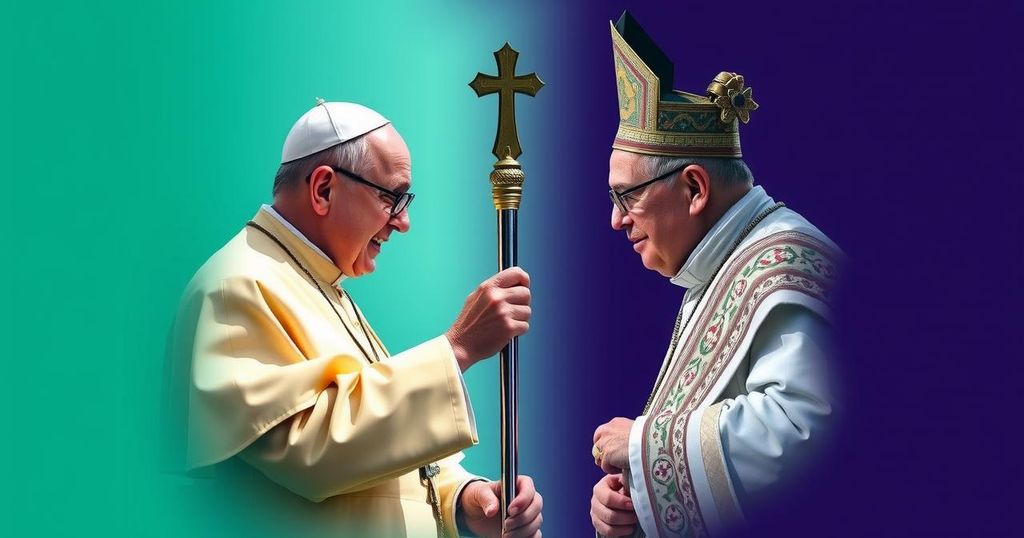At COP29, the Vatican has joined forces with other nations to block discussions on women’s rights related to climate change, raising concerns over gender identity references. This has stalled vital negotiations aimed at supporting women, who represent a significant majority of those displaced by climate issues. Advocates stress a pressing need for a global agreement to address the specific vulnerabilities women face.
At the recent COP29 climate summit in Azerbaijan, a dispute erupted regarding gender rights, with the Vatican playing a key role in obstructing discussions on women’s rights. Reports indicate that representatives from the Vatican, aligned with nations such as Saudi Arabia, Russia, Iran, and Egypt, have sought to eliminate references to gender from a crucial agreement aimed at supporting women affected by climate change. Colombia’s environment minister publicly expressed her frustration over such actions, underscoring the need for a deal that recognizes the disproportionate impact of climate change on women and girls, who comprise approximately 80% of individuals displaced by climate-related events.
The proposed agreement, which seeks to update the Lima Work Programme on Gender, has faced significant hurdles due to resistance from these nations, which express concerns over the inclusion of transgender individuals and references to gay women. Such objections have led to a comprehensive stall in negotiations aimed at enhancing women’s access to critical climate support. The Latin American delegation remains adamant about prioritizing gender equity in climate discussions, recognizing the historical context of gender disparities exacerbated by climate change. Experts from various charities have stressed the urgency of establishing a global framework before the current program expires at the end of the year, warning that failure to do so could further marginalize women’s issues in climate negotiations.
The Vatican’s shift in position comes amid a broader global backlash against the recognition of women’s and LGBTQ+ rights. Although Pope Francis has allowed for some degree of acceptance within the Catholic Church, the Vatican has reiterated its traditional stance on marriage and gender identity. The outcome of the current summit is critical, as the existing UN gender and climate programme is on the verge of lapsing, and representatives acknowledge that insufficient female representation at negotiating tables hampers effective advocacy for women’s rights.
It remains to be seen whether a consensus can be reached within the limited timeframe remaining for discussions. Colombian officials and advocacy groups continue to push for commitments that ensure women receive the necessary resources and recognition in climate initiatives, advocating for diversity in feminist movements in the face of opposition from traditionalist factions.
The issue of gender rights in climate action has gained substantial attention as global discussions highlight the need for policies addressing the unique challenges women face due to climate change. Given that women are often at the forefront of these challenges, more comprehensive recognition and funding for women’s initiatives in climate response are crucial. The COP29 summit aims to address these disparities through the Lima Work Programme on Gender. However, recent developments indicate escalating tensions surrounding definitions of gender and representation of sexual orientation that threaten progress. Over the past decade, the acknowledgment of women’s pivotal role in environmental sustainability has prompted calls for equitable funding and resources in climate action plans. International organizations assess gender-related impacts, underscoring that women disproportionately suffer from climate-related disasters and displacement. The refusal of certain nation blocs to recognize diverse gender identities in climate negotiations puts crucial support for women and girls at risk.
In summary, COP29 has emerged as a significant arena for discussions surrounding the interplay of gender rights and climate action, yet it faces hurdles due to the Vatican and allied nations’ opposition to gender references. The potential lapse of global support structures for women confronting climate change looms, underscoring the critical need for negotiation outcomes that reflect the diverse experiences of women. As the summit progresses, stakeholders remain hopeful for a resolution that prioritizes equity and inclusivity to advance women’s roles in climate resilience.
Original Source: www.bbc.com






